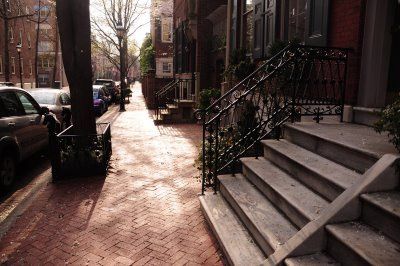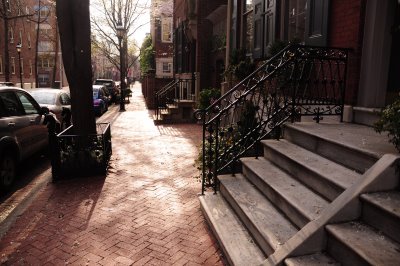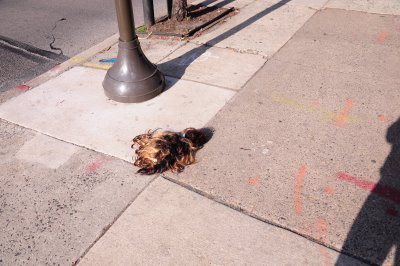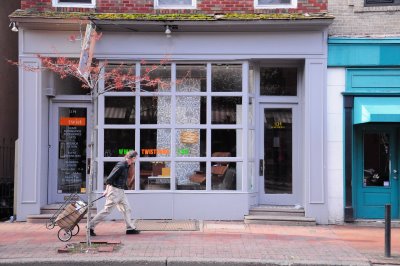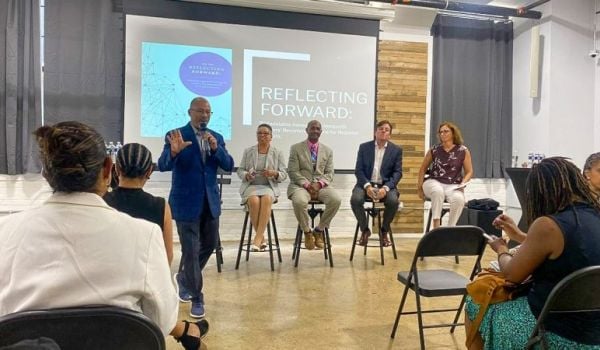Last night I ran for a seat on the Washington Square West Civic Association‘s board and got a three-year term. I’m really excited to use the board as a way to get more involved in my community, and particularly to engage the young people who live and work in the neighborhood.
One of the nicest streets in Washington Square West.
At the annual meeting last night, conversation got most heated around the new bike lanes on Spruce and Pine (mostly everyone loved them, but obviously not everyone loves bikers), but many times came back to the petty crime and illegal sex that plagues the neighborhood. I remember a particularly poignant moment when a white-haired lady mentioned how often there are used condoms on the walkway outside her house. Others mentioned tactics to try to dissuade sex acts from happening right outside their houses such as installing outdoor lights, or just returning home earlier so as not to be accosted by prostitutes. The neighborhood is home to hospitals and a medical school, which often require doctors to walk to work in the middle of the night — a simple task that is made difficult by the fact that there are people selling sex and drugs on the street at all hours. Many complained about the police’s apathy to the problem — few officers in our precinct are certified to arrest for “vice”, others don’t bother arresting the prostitutes because the arrest process can often take too long. But the conversation made two things clear: prostitution is a problem that no one knows how to solve and that bothers almost everyone.
A wig that was left on the street.
I clean up the area around and under my stoop at least once a week. Yesterday was a typical catch — a box of condoms, one or two used ones, some tall cans of beer, tiny plastic bags used for drugs. This time, however, there was a new element: human feces. I’ve been almost amused by litter that collects on and around my stoop. There are days when I come home from work to find someone’s half-eaten sandwich or coffee cup by my mail slot. Other times when there’s an empty box of cigarettes or a spare shoe. But the crap really got to me. When I got home from the WSWCA meeting and talked to my housemate, she mentioned she found a crack pipe on the front step Saturday morning. I’m growing weary. And the conclusion I’ve drawn is that prostitution and drugs go hand in hand; and they also lead to disrespect for the neighborhood, in terms of litter and petty crime. All of which lead to disgruntled citizens, all of which leads to Philadelphia’s population problem and its reputation for being a dirty, crime-ridden, unpleasant city.
The neighborhood tolerates the prostitution and the drugs and the disturbing behavior that goes with it for a number of reasons. I asked my 80-year-old neighbor why so little has been done about it and she mentioned that prostitution has been centered in the neighborhood for as long as she’s lived in the area. It was centered at 13th and Locust and pre-dated the gay bars that have changed the sex trade’s clientele. The police have moved the center of the trade by a few blocks here and there, but it remains centered in the neighborhood. Why is it tolerated? I’m guessing because it’s Philadelphia, a city which often expects too little of itself — I think most people don’t want to rock the boat or complain, because, well, the neighborhood could be much worse. Maybe people think that there are worse problems to have than prostitutes and crack. At least the neighborhood is largely nonviolent and has vibrant businesses. And no one wants the neighborhood to gentrify too much. Some people think it would it be better to have a few prostitutes and a little crack than to change as New York City’s Meatpacking District did from the locus of clubs and prostitutes to an inauthentic strip of expensive clothing boutiques and overpriced restaurants. And on days when there’s no crap outside my house, I tend to agree. Lastly, prostitution will never completely disappear, so people throw their hands in the air.
A typical small business in the Washington Square West neighborhood.
Isn’t it possible to crack down on the crack and the prostitution and keep Washington Square West a vibrant, livable place? I’m going to start to do research on some best practices in other cities, but I’m curious to know if anyone out there knows of other cities or neighborhoods that have had similar problems but resolved them in a way that satisfies most stakeholders?

Diana Lind is the former executive director and editor in chief of Next City.

